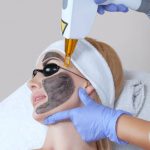This prospective randomized trial shows that patients with lichen sclerosis can improve their symptoms and score without experiencing any serious side effects, either short-term or long-term. These improvements were seen in both the normal dose and low dose laser groups, which were originally intended to be a placebo. It is important to note that no activation (Koebner phenomena) of lichen has been detected, which is encouraging for future patients with lichen who wish to undergo laser treatments. We observed that the majority of participants were satisfied with the treatment during the period of repeated applications. Perhaps the frequent medical contact with patients and the intense discussion of their subjective feelings about their symptoms cause a kind of placebo effect. This study’s weakness was the incomplete FSFI questionnaire, which was not sufficient to draw any conclusions. This could be due to the patient’s embarrassment when it comes to sexual function. This will be taken into account for future research.
Myth: Lasers emit radiation.
Fact: Lasers do not emit harmful ionizing rays but instead use light. Normal sunlight is more likely to cause cancer than modern medical lasers.
Myth: Lasers can be harmful to your health.
Fact: The laser light only penetrates 1-4mm into the skin. Laser hair removal only destroys the superficial hair roots, as light cannot penetrate to the deeper roots. It is, therefore, impossible for the light to reach any deeper organs in the body.
Myth: Lasers cause burns.
Reality: Modern lasers are based on the selective photothermolysis theory developed at Harvard Medical School. Laser light is like magic bullets, and it searches for and destroys the target. Lasers emitting green light, for instance, will only be absorbed by red blood vessels. So, abnormal blood vessels such as those in birthmarks, broken veins, and even in the eyes of diabetics that are present in their eyes can be safely removed. As with all technologies, there are risks of side effects. However, the chances of a burn with a good machine in expert hands are minimal.
Myth: Laser hair removal hurts.
Truth: With proper scientific methods during treatments, you will only feel a little warmth or a pin-prick sensation. Some patients, particularly those with sensitive areas such as the bikini area or underarms, may require topical anesthetic before treatment.
Myth: Lasers thin the skin.
TruthLasers cause thickening after treatments. The skin is a living tissue, and the gentle heat generated by laser treatments in the dermis induces the formation of new collagen and elastic tissue to replace the damaged older tissue. Lasers can have a rejuvenating effect, as they reduce wrinkles and make the skin plumper. Your laser physician must have an in-depth knowledge of laser physics in order to achieve the desired result.
Myth: Lasers cost a lot of money
Reality: It costs more in the long term to use foams, razors, and waxing. Traditional hair removal methods are the best way to keep your skin smooth. These methods are also painful and tedious and must be continued for life. Lasers, on the other hand, can achieve permanent hair reduction with a few sessions that are painless over a few weeks.
Myth: Lasers do not need to be used
Fact: Lasers are essential for many medical conditions. No creams or medications can remove tattoos, scars, varicose and port wine stains, or remove birthmarks. Laser technology can also be used to treat many internal medical conditions.
Myth: Lasers cause cancers.
Reality: Lasers can be used to treat skin cancer and other types of cancer. The wavelengths of laser light do not cause cancer.
Myth: If you stop laser treatment, your skin will deteriorate.
Fact: Lasers cause skin rejuvenation. They make skin look younger by aligning and tightening the tissue. The aging process continues each year. Some people opt to continue the treatment even after just a few sessions.
Myth: All Laser Treatments are the Same.
The truth: No two laser machines will ever be the same. Laser experts are also not all the same. Laser machines must be reliable to achieve optimal results. Your dermatologist must have a thorough understanding of the skin and laser physics.




